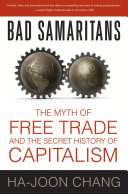Bad Samaritans: The Myth of Free Trade and the Secret History of Capitalism
 | |
| Author | Ha-Joon Chang |
|---|---|
| Country | United States |
| Published | 2007 |
| Publisher | Bloomsbury Press |
| ISBN | 978-1596915985 |
Bad Samaritans is a book about economy written by Ha-Joon Chang, a South Korean institutional economist specialising in development economics. The book criticizes economic mainstream and neo-liberalism. Chang mentioned developed countries require developing countries to change and open their markets. Rich and powerful governments and institutions are actually being 'Bad Samaritans': their intentions are worthy but their simplistic free-market ideology and poor understanding of history leads them to inflict policy errors on others.[1]
Summary
Chang argued uncomfortable truth of capitalism and criticizes globalization represented by the book "The Lexus and the Olive Tree" in the first chapter. He argued that there are errors in theories regarded as established theory related to economic development and refuted them with economic theory, and historical and current data. In the later chapter, Chang claimed that "Market and democracy clash at the fundamental level." In epilogue, he wrote about Brazil in 2037 that faced gloomy future as a consequence of reckless beliefs in neo-liberalism policies. Finally, he made the case for new strategies for a more prosperous world that may appall the 'Bad Samaritans'.
Controversy
In 2008, Ministry of National Defense of South Korea release a list of 23 'seditious' books including "Bad Samaritans". The books on the list cannot be read or kept on bases under military regulations. The ministry argued it may cause misunderstanding among the readers about the free market economy. The army argued that the books contains some information that related to antigovernment and anti-Americanism.[2]
American linguist Noam Chomsky said, "It is unfortunate that the Ministry of National Defense is afraid of freedom and is trying to control people," and also said, "The name of the Ministry of National Defense should be changed to Ministry of Defense against Freedom and Democracy.”[3]
Critical reception
Antoine Cerisier in socialjusticefirst writes that "Despite largely favourable reviews, the book has been criticised in the Financial Times and The Economist – as one might expect. Critics argued that empirical evidence usually supports the main argument put forward by free trade economists, namely that trade liberalisation is good for growth and development. In a 2002 journal article entitled “Growth is good for the poor”, Dollar & Kraay concluded that free trade triggers growth and helps alleviate poverty in the global South. Nonetheless, as Chang would respond, it is probably the opposite: states are more willing to liberalise trade once they reach a certain level of economic development. The journalist admits that the East Asian example can illustrate the use of protectionism and state intervention in the economy."[4]
In The Economist review, the reviewer noted the book has writer's personal reflection and rhetorical set-pieces. The book aims to "discomfort neoliberals". The review criticized the author for "shaky grip on the historical record". The review concludes that the book is an interesting if controversial addition to the ongoing "200-year duel between the Hamiltonians and the liberals".[5]
In the Washington Post review, Paul Blustein, a journalist in the Global Economy and Development Program at the Brookings Institution, wrote “Chang's book deserves a wide readership for illuminating the need for humility about the virtues of private markets and free trade, especially in the developing world.”[6]
Tom Gallagher in San Francisco Chronicle claimed that the free market ideology has been enforced by today's dominant countries and they are "kicking the ladder" which they have climbed to the top, thereby they are preventing poor countries from climbing the ladder that they have used. He concludes the review by saying that developing countries "have to defy the market".[7]
Thom Hartmann In the Buzzflash review, He chose the book as Thom Hartmann's independent thinker book of the month review. He mentioned past-policies of America, for example, policies from Ronald Reagan, George H.W. Bush to Bill Clinton to show why the rapid unraveling of the American middle class was made. Thom said 'Bad Samaritans' is able to help understand why and how America has become so rapidly and radically deindustrialized.
In South Korea, in OhmyNews review, Gabsoo Kim, reviewer, said Bad Samaritans pointed out the errors of a global standard that leading countries like US use to compel a developing country to adopt the liberal market economy. Kim mentioned the book is very pro-capitalistic as Prof.Chang is a scholar who thoroughly trusts capitalism. He considered the book perfectly timed when neo-liberalism was confronted with serious challenge by the financial crisis from the US.[8]
References
- ↑ Chang, Ha-Joon; Bond, Jim; Audio, Brilliance. Bad Samaritans: The Myth of Free Trade and the Secret History of Capitalism. Brilliance Audio.
- ↑ 전현석 [Jeon Hyeon-seok] (2008-08-01). "국방부 불온서적' 23권 열독운동?" [Let us read Ministry's of National Defense of South Korea list of 23 seditious books] (in Korean). Retrieved 2016-11-25.
- ↑ 홍경화 ([Hong Kyung-hwa] (2008-10-25). "국방부 불온서적 지정된 촘스키 '생각과 표현통제는 불행한 일'" [Named as seditious book by Ministry of Defense; Chomsky: 'control of thought and expression is unfortunate']. The Hankyoreh. Retrieved 2016-11-25.
- ↑ Cerisier, Antoine (2012-03-31). "Book Review: Bad Samaritans by Ha-Joon Chang". socialjusticefirst. Archived from the original on 2015-09-26. Retrieved 2016-09-26.
- ↑ "Pistols at dawn". The Economist. 2007-08-30. ISSN 0013-0613. Retrieved 2017-10-05.
- ↑ Blustein, Reviewed by Paul (2008-02-17). "The Case Against Globalization". The Washington Post. ISSN 0190-8286. Retrieved 2016-11-25.
- ↑ "'Bad Samaritans' and 'myth' of free trade". SFGate. Retrieved 2016-11-25.
- ↑ "오바마는 '나쁜 사마리아인'일까". 오마이뉴스. 2008-11-08. Retrieved 2016-11-25.